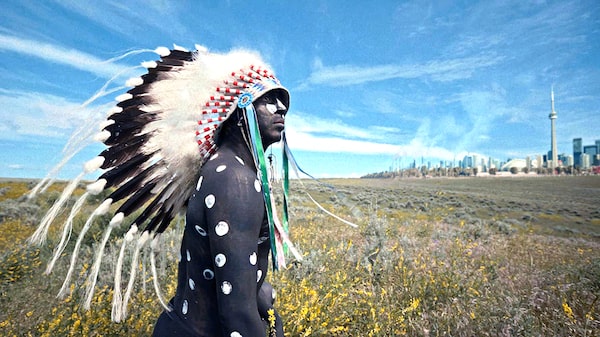
Based on Thomas King’s award-winning 2012 study, The Inconvenient Indian: A Curious Account of Native People in North America, Michelle Latimer’s documentary examines the ongoing colonization of Indigenous peoples in North America.Courtesy of TIFF
Inconvenient Indian
Written and directed by Michelle Latimer
Featuring Thomas King, Nyla Innuksuk and Kent Monkman
Classification N/A; 90 minutes
Premieres April 8 at 9 p.m. ET on APTN; streaming on APTN lumi starting April 9
Critic’s Pick
It is either a complete accident or a curiously aggressive programming move for the National Film Board and Aboriginal Peoples Television Network to release Inconvenient Indian this Friday, at the tail end of Canadian Screen Week and just two days before the broadcast of the 2022 Canadian Screen Awards.
Inconvenient Indian, one of the most infamous Canadian documentaries ever made that few people have actually seen, is directed by Michelle Latimer, whose career was upended in December, 2020, after the CBC published a feature scrutinizing her Indigenous heritage. Quickly, the documentary’s producers pulled the film from distribution, and Latimer saw her other big 2020 production, the acclaimed CBC series Trickster, cancelled by the network – only for it to later earn 15 Canadian Screen Award nominations (though Latimer herself received none).
To say that there is a certain level of bitter Cancon irony in Inconvenient Indian finally making its way into the world on the eve of the Canadian screen sector’s biggest celebration is putting it mildly.
But after nearly one and a half years of controversy, what are audiences who tune in to APTN Friday night (or stream the doc afterward on APTN lumi) to make of Latimer’s much-discussed film? Is it possible to consider and appreciate Inconvenient Indian as a work of cinema while isolating whatever your thoughts might be on Latimer’s own life – a life that she has continually defended, telling The Globe last year that she is a “non-status Algonquin of mixed blood, Métis, French-Canadian heritage. And that’s what I can stand by with truth”?
Resorting to the “separate the art from the artist” line of thinking can be exhausting and sometimes arbitrary – and it appears to be a tension that APTN has not yet completely resolved itself, given that the network’s online media page for the film makes no mention of Latimer. But there is also a reason why APTN is finally airing her work, after holding “a series of meaningful consultations involving all the Indigenous participants whose stories the film presents”: It is an excellent documentary, adventurous and bold.
A defiantly loose but also highly respectful adaptation of Thomas King’s 2012 non-fiction book The Inconvenient Indian: A Curious Account of Native People in North America, Latimer’s film takes delight in breaking conventions while attempting to build new ones from scratch. Unlike much of contemporary documentary cinema, there are no talking heads or stitched-together archival footage. Instead, Latimer’s exploration of modern Indigenous culture is as fluid in form and approach as the artists whom she chronicles on camera.
There is an insightful tour through Kent Monkman’s studio. Quiet moments with Christi Belcourt. A movie-within-a-movie-about-another-movie interlude in which Latimer follows the makings of Nyla Innuksuk’s forthcoming Nunavut-set sci-fi thriller Slash/Back. And watching it all unfold, in another mischievous meta moment, is King himself, seated in Toronto’s Fox Theatre where he acts as a quasi-narrator.
Visually poetic and narratively engaging – each of Latimer’s subjects feels worthy of their own stand-alone film – Inconvenient Indian dissects centuries of history and incalculable amounts of pain to present an engaging, demanding and rewarding cultural portrait.
I’ll admit that not everyone will be open to approaching the film – and I’ll confess here that I initially planned to include Inconvenient Indian on my list of the 10 best Canadian films of 2020, before shamefully balking during the controversy’s first eruption. But if on this Canadian Screens Award weekend we are indeed asked to consider the state of the country’s arts – where we have been, and where we might be heading – then watching Inconvenient Indian feels like an essential act.
Plan your screen time with the weekly What to Watch newsletter. Sign up today.
 Barry Hertz
Barry Hertz